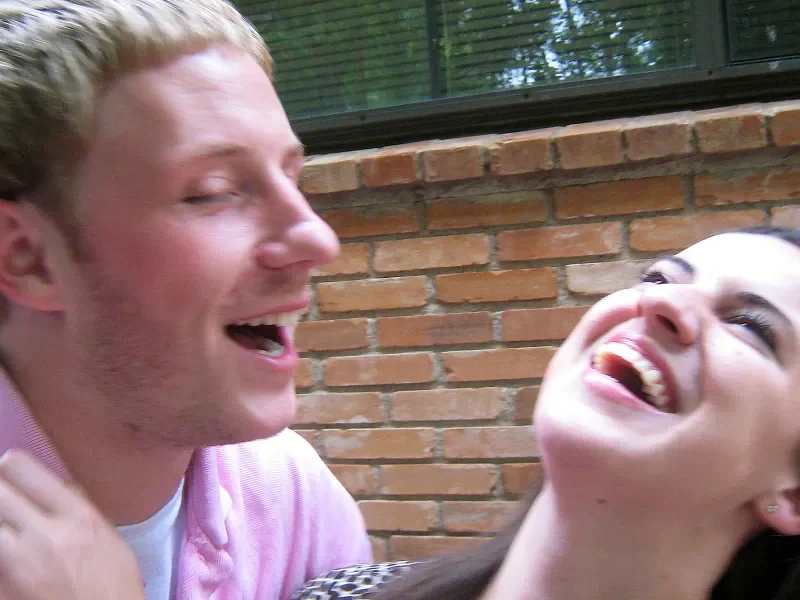Losing my parents changed everything, but it wasn’t until the will was read that I realized just how alone I really was.
I always thought grief would come crashing in like a wave — loud, violent, all at once. But for me, it trickled in. A voicemail from a stranger. A sterile hospital waiting room. Two cops who wouldn’t meet my eyes.
My name’s Rachel. I’m 19, and last fall, my world fell apart when my parents died in a car crash. One minute they were on their way to dinner; the next, I was standing in a cold hallway at 3 a.m., clutching a paper cup of vending machine coffee, wishing I could hit rewind.
After the funeral, the house was too quiet. I kept expecting to hear Mom humming in the kitchen or Dad calling from the garage. I barely left my room except to feed the cat and microwave frozen meals. Grief has a way of shrinking the world.
Then came the will reading.
I showed up in borrowed black slacks and a blazer that still smelled like my mom’s perfume. My hands wouldn’t stop shaking, so I twisted the hem of my shirt like it was a life raft.
Across from me sat Aunt Dina — technically my dad’s sister, though I’d never once heard him speak kindly about her. She wore a tight red dress like she was headed to a cocktail party instead of a legal meeting about her dead brother’s estate. She didn’t cry; didn’t even pretend to.
The lawyer cleared his throat. “According to the will, the house will be passed on to Ms. Dina.”
I blinked. “I’m sorry, what?”
Dina smiled like a cat who just ate the canary. “You heard him.”
“That’s not possible,” I said, my voice shaking. “My parents would never—she hated my mom. She barely spoke to us.”
The lawyer shifted uncomfortably. “This is what’s documented. The will appears to be valid and signed.”
I felt like the air had been sucked out of the room. “There has to be a mistake.”
“There’s no mistake,” Dina said, leaning back like she owned the place already. “It’s my house now.”
I left the office numb, replaying every memory of my parents, trying to figure out how this could have happened. I kept hoping someone would call me and say it was a clerical error. No one did.
Two days later, she came knocking.
I opened the front door in pajamas and fuzzy socks. She didn’t even bother with small talk.
“You’ve got one day to pack up and get out,” she said, crossing her arms. “I want the place cleaned up before I move in.”
My heart dropped. “Dina, I don’t have anywhere else to go.”
She shrugged. “Not my problem.”
“I’m your niece.”
“Correction,” she said, stepping past me like she owned the floor. “I’m your landlord. And I want you out.”
I tried to plead. I told her I could find a job, help with the bills, or anything else. She just rolled her eyes and flopped down on the couch.
“Can you move? You’re blocking the TV.”
So I packed.
I didn’t sleep that night. Just moved slowly through the house, folding clothes into suitcases and wrapping photo frames in towels. Every corner of that place held a memory: Dad teaching me to ride my bike in the backyard, Mom dancing with me in the kitchen, birthday parties with homemade cake, and the smell of cinnamon in the air.
Dina spent the night watching reruns, eating chips, and occasionally tossing passive-aggressive comments over her shoulder.
“You always did have too much stuff.”
“I’m packing as fast as I can,” I whispered, not trusting myself to look at her.
The next morning was dull and humid. I stood on the front steps with two suitcases and a dying peace lily that my mom had kept in the kitchen window. My eyes burned, but I didn’t let the tears fall, not in front of her.
I turned back to take one last look at the only home I’d ever known. The windows, the porch swing, even the cracked path leading to the mailbox, they all felt like ghosts now.
And that’s when I saw it.
A black limousine glided down the street like something out of a movie. It stopped right in front of the house.
I frowned. Dina definitely didn’t have limo money, unless scamming your dead brother came with perks.
I was about to walk past it, dragging my bags down the driveway, when the door creaked open.
“Rachel?”
I froze.
A tall man in a gray suit stepped out. He had sharp cheekbones, neatly combed dark hair, and the kind of posture that screamed money and manners. He adjusted his tie and looked right at me.
“Uncle Mike? Is that really you?”
I couldn’t believe my eyes.
He smiled, a little softer now. “You’ve grown, kid. The last time I saw you, you were still into glitter pens and drawing cats on everything.”
I couldn’t help but laugh through the confusion. “And you were the guy who gave me a fountain pen for Christmas when I was, like, eleven. I thought it was a wand.”
He chuckled. “Not far off. Pens can be powerful. And this time, I brought a different kind of magic.”
I stared at him, still not sure if this was some weird dream. “What are you doing here?”
Mike held up his phone. On the screen was a photo that made my stomach twist. There was Dina, posing smugly in the doorway of our house, wearing oversized sunglasses and that awful leopard-print scarf she thought made her look “glam.”
The caption read: New beginnings! So proud to finally have what was meant for me.
My chest tightened. “She posted that? Seriously?”
“I saw the Facebook post last night,” Mike said, slipping the phone back into his pocket. “Your dad would’ve lost it if he saw that. So I started digging.”
Before I could respond, two police cruisers turned the corner and rolled up to the curb. My eyes widened.
“What… what is this?”
Mike didn’t flinch. “Just stay close. It’ll be alright.”
The officers stepped out, one of them adjusting his belt, the other scanning the front of the house like he’d done this a hundred times before.
“Morning,” Mike greeted them. “Thanks for coming.”
We walked together toward the house — me, Mike, and two officers — like some weird justice parade. I gripped the peace lily tighter. The petals trembled in the wind.
Dina opened the door just as we reached the porch. She was wrapped in a silk robe that looked too expensive for someone who claimed to be broke, and she held a mimosa as if it were part of her everyday attire.
Her face twisted. “Rachel? What are you doing here? You can’t just—”
“Don’t,” Mike said calmly, raising a hand. “Just don’t finish that sentence.”
He turned to the officers. “May I?”
One of them nodded.
Mike popped open his briefcase and pulled out a thick folder. “This,” he said, flipping it open, “is proof that Ms. Dina submitted a forged will. The original never existed. We have confirmation that the document was created posthumously, and the signature was traced from a medical consent form.”
“What?” I breathed, barely able to keep up.
He didn’t stop. “The lawyer who read the will? Paid in cash. No license. We’ve tracked everything. Bank statements, handwriting analysis, and witness accounts. It’s all here.”
Dina’s drink sloshed slightly. “This is ridiculous,” she snapped. “You can’t prove anything!”
“Oh, but we already have,” Mike said, his voice steel under velvet.
I’d never seen someone deflate so fast. Her lips parted, then shut, and her eyes darted toward the officers, like she was looking for an exit.
One officer stepped forward and said, “Ms. Dina, we need you to come with us.”
Dina stammered, “I… I need to call someone—”
“You can do that from the police station,” the officer said, pulling out handcuffs.
“Wait—wait, hold on,” she yelped, but they didn’t.
She was cuffed right there on the porch, spilling her drink all over her pink slippers.
I just stood there. Watching her squirm. I didn’t feel triumphant. I didn’t feel angry. I felt… tired. But a good kind of tired. Like when you finally exhale after holding your breath too long.
As they drove off, Uncle Mike stood beside me with a deep sigh.
“I can’t believe she did that,” I whispered.
“She was always jealous of your dad,” he said. “Even when we were kids. But this? This crossed every line.”
I nodded slowly, my fingers brushing the edge of the peace lily’s pot.
“You’re not alone, Rachel. You’re not,” he added, gently. “I should’ve come sooner.”
*****
Three months passed.
The case went to court. It turns out, my parents hadn’t left a will at all. They never expected to go so young. With no legal will in place, the court ruled I was the rightful heir. The house was mine. Dina’s name got erased from every document as if she had never been there.
Her phony real estate listing vanished. The keys she’d bragged about were handed to me in a quiet moment outside the courtroom.
Oh, and Uncle Mike? He sued her for legal fees, emotional damages, and fraud.
She didn’t just lose the house.
She lost everything.
I heard through a neighbor that she now lives above a vape shop on the far side of town. One of those cramped one-bedroom units with flickering lights and no central air. A far cry from the marble kitchen island she used to show off on social media.
As for me?
I’m home.
That sentence feels surreal even now. I’m sitting in the living room where I used to build blanket forts with my mom. The couch has a new cover, and the air smells like cinnamon again. I’ve started planting new flowers. Fresh herbs in the kitchen. Basil, lavender, a bit of rosemary.
And the peace lily?
It bloomed last week.
I stood there staring at it for a long time. Its white petals unfurled like a sigh, quiet and stubborn. Just like me.
Uncle Mike comes by sometimes with his weird gifts. A vintage chess set. A fancy notebook. He even helped me fix the leaky bathroom faucet last Sunday.
“You’re tougher than you think, Rachel,” he said, handing me a wrench. “Your dad would be proud.”
I smiled. “Thanks, Uncle Mike. For everything.”
He shrugged. “What are uncles for?”
I still miss my parents every single day. But I’m learning how to build something new from the ashes. Not just a home, but a future.
And that peace lily? It’s staying by the window.
Right where it belongs.


